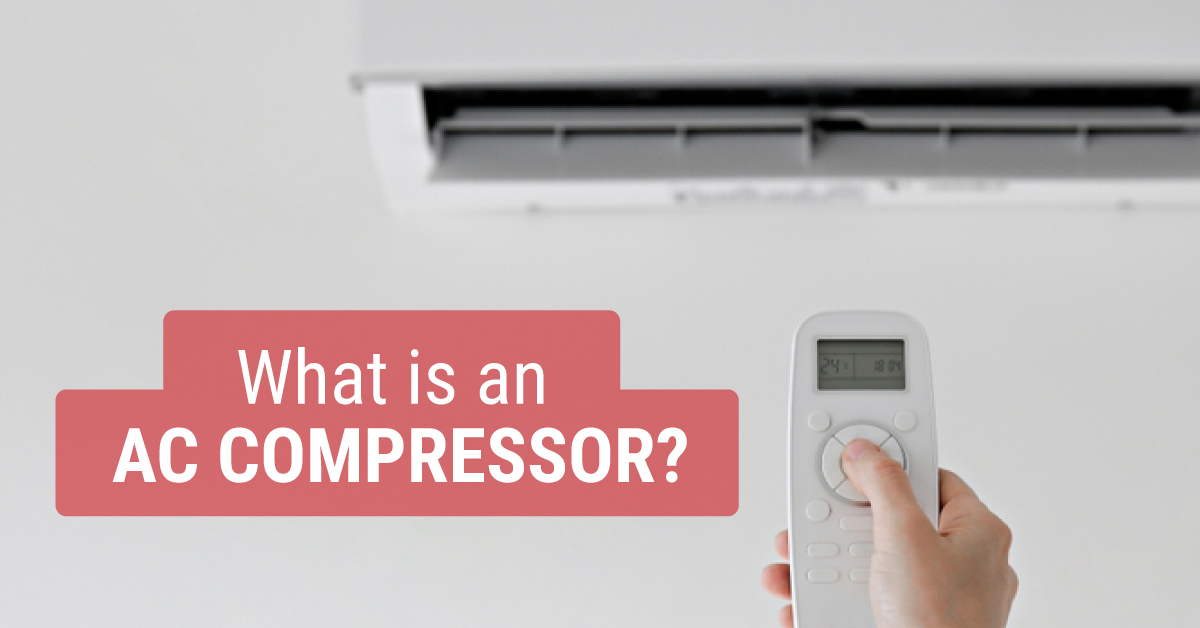Author: Jeff O'Hara
Many professional HVAC experts like Nick’s Air Conditioning refer to the air conditioner compressor as the literal “heart” of your AC system. Like your heart, the AC compressor is responsible for circulating the system’s lifeblood—in this case, liquid refrigerant—which carries and releases heat collected from your living space.
The air conditioning compressor is critical for the proper function of the cooling process in an AC system. The compressor is the component responsible for compressing the liquid refrigerant, which raises its temperature, making heat transfer possible. Without a functioning compressor, your HVAC system cannot remove the heat from your living space, rendering it essentially useless.
What Does an Air Conditioning Compressor Do?
Your AC system’s compressor is the most vital component in the entire system, responsible for circulating liquid refrigerant and compressing it to enable it to draw heat from the air. It’s a complicated process, but we’re going to break it down into a few key steps so that we will not only deal with a better-informed customer, but you’ll also have endless AC compressor trivia tidbits to share with your friends at the next dinner party!
1. Circulation of Refrigerant.
The compressor works in conjunction with other components in the HVAC system, such as the evaporator coil, condenser coil, and expansion valve. The chemical refrigerant has properties that enable it to absorb, carry, and release heat as it circulates through the various components.
2. Compression.
The compressor receives low-temperature, low-pressure refrigerant vapor from the evaporator coil. It compresses the refrigerant, increasing both its pressure and temperature. This process is achieved through the compressor’s mechanical action, reducing the gas’s overall volume through compression.
3. Heat Release.
As the refrigerant vapor is mechanically compressed, its temperature rises significantly. The high-pressure, high-temperature refrigerant then moves to the condenser coil, releasing collected heat into the surrounding environment.
4. Condensation.
The release of heat causes the refrigerant to transition from a gaseous state to a liquid form through a process called condensation. This occurs when the high-temperature refrigerant passes through the condenser coil, which facilitates heat transfer and promotes cooling.
5. Expansion.
After condensing into a liquid state, the high-pressure refrigerant passes through the expansion valve, which opens to reduce pressure. The pressure drop causes the refrigerant to evaporate and transform back into a low-pressure vapor.
6. Cooling Effect.
The evaporating refrigerant absorbs heat from the indoor air that is circulated over the evaporator coil. This heat absorption process cools the air, which is then blown back into the living space by the system’s blower fan.
7. And Repeat.
No one ever claimed that the life of an air conditioning compressor was glamorous. It’s a stunningly dull existence, performing the same task over and over—usually under the most horrific weather conditions—all for the comfort of the family that lives inside the house.
How Long Does an AC Compressor Last?
For reputable brands like Trane® and Mitsubishi Electric, a homeowner can expect a solid ten to fifteen years of service from their AC compressor. Many new construction homes use builder-grade HVAC systems from manufacturers that use cheaper parts, leaving many homeowners having to replace a compressor only five or ten years into its life.
Signs Your Air Conditioning Compressor is in Trouble.
The Temperature Never Really Changes in the House
You run your air conditioner for hours, but it never achieves the desired temperature or humidity levels. As the compressor begins to fail, it becomes far less effective at releasing the heat collected by the liquid refrigerant into the outside air. The hot air absorbed by the liquid refrigerant gets trapped inside the compressor, which backs the stagnant coolant into your home, making any temperature or humidity drop impossible.
Unusual Noises from the AC Unit
It is normal for the compressor to make a gentle “click” upon startup and a continuous, low-level hum during a cooling cycle. When compressors begin to fail, they make it known in various noisy ways, most commonly in the “hard start.” This problem results in a loud electrical humming sound emitting from the AC unit before the compressor eventually turns on. Usually caused by a failing capacitor, the compressor can temporarily not balance the pressure difference inside and outside the system.
As compressors age, their carefully machined and aligned mechanical components begin to wear and break down. Loose piston rods, a damaged crankshaft, or a piston pin will cause the compressor to make a loud banging sound when engaging. Needless to say, any new, strange sounds that are coming from anywhere within your HVAC system warrants a call to a professional HVAC company.
Repeated Circuit Breaker Tripping
If your HVAC system circuit breaker trips repeatedly, you should listen to your HVAC compressor for the signs of hard starts listed above. When the AC system gets the signal from the thermostat to turn on, the compressor cannot engage due to improper voltage from a bad capacitor or because the compressor has failed. All the energy sent from the electrical panel has nowhere to go once it reaches the ineffective components and stops. The ‘backed up’ electricity causes the copper wires from the breaker box to heat, and eventually, the breaker trips, preventing any damage to the unit—or your home.
Frequent On/Off Cycles
If your HVAC system frequently turns on and off in quick intervals—known as “short cycling,” it could be a sign of compressor issues. A malfunctioning compressor may cause the HVAC system to shut down prematurely during cooling cycles, making it difficult—or impossible—to maintain comfortable results in the home.
Increased Energy Bills
A failing compressor can lead to reduced energy efficiency. If you notice a sharp increase in your energy bills without any change in usage patterns, it could indicate that the compressor needs help to keep up with your household demands efficiently.
Can I Repair an AC Compressor?
An air conditioning compressor is not a part that an HVAC technician in the field can repair. Old compressors must be recycled for parts, and their metal housings are also recycled into new compressors. The only way to “fix” a broken AC compressor is to replace it.
How Much Does a New AC Compressor Installation Cost?
A replacement AC compressor can come with a price tag between $800 and $1,400 for parts alone. Tack on to that cost the price of labor to install it –usually, around $100 per hour on a six-hour job—and that compressor just went over $2,000.
Should I Replace My Compressor or My Entire AC Unit?
Nick’s Air Conditioning has a recommendation we make to our AC compressor customers: if the cost of replacing the compressor exceeds 50% of the price of a new unit, replace the entire AC unit. The main reason for this rationale is that once the compressor has failed, it’s only a matter of time before other components become problematic. Another good rule of thumb we often offer our customers is that if an HVAC system is over seven years old and requires significant AC repairs, it’s probably time to replace it.
Aside from compressors, evaporator coils are expensive, and they eventually fail as well. As will outdoor fan motors, plus the extensive electronics and wiring that keep everything under control, having endured a few brutal summers themselves, end up with brittle wires that create poor electrical contacts and hazardous short circuits.
Who Can Help Me Decide the Best Solution to My AC Compressor Problems?
If you’re experiencing any of the signs of AC compressor issues like those described above, you should probably enlist the services of a professional HVAC company. Nick’s Air Conditioning only employs licensed, trained, and background-checked HVAC technicians to come to your home, evaluate your HVAC system’s condition, diagnose potential issues, and recommend the best ways to remedy them.
If you decide that it’s time to replace your outdoor air conditioning unit, your Nick’s technician can help you select a new central AC unit or complete HVAC from Trane® Technologies. Are you looking to save on the expense of a central HVAC system? Ask your Nick’s Air Conditioning representative about our single and multi-zone ductless mini-split systems selection from Mitsubishi Electric.
Give Nick’s a Call Today. We’re on the Way!


